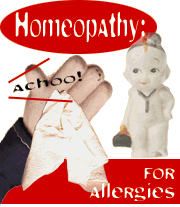LIVING & TRAVEL

by Steve Taormina
August 29, 1996
Third in a series
Previous articles:
August 15: Introduction to Homeopathy
August 22: Homeopathy for Camping
RESOURCES:
Homeopathic Educational Services
Introduction to homeopathy, specific remedies, and how to find professional homeopathic care.
Bastyr University
Bastyr University in Seattle offers courses on homeopathy, and takes a scientific approach to naturopathy.
Homeopathy Home Page
This site is a great jumping off point -- it lists homeopathic websites, newsgroups, faqs, book lists, mailing lists, and worldwide addresses for locating homeopathic care.
Limited Infinity Health
This site has a directory of certified naturopathic physicians, listed by state.
Health World
Health World's Homeopathic Center is a great resource for specific homeopathic remedies, from caffeine addiction to stuttering.
Usenet: misc.health.alternative
Most people know at least a little about allergies. They know that when they walk outside and their eyes start to water, their noses itch, and they begin to sneeze, then it's allergy season.
What many people don't know is that these symptoms are your body's very prompt and over-reactive response to an allergen, which might be anything from tree or grass pollens to dust, mold or even cat dander.
"Your immune system provides protection against all the bacteria and other foreign invaders that can harm you, but in the case of an allergy, it goes overboard and attacks harmless substances such as pollen and dust," explains Lauri Aesoph, N.D., a medical writer from Sioux Falls, S.D. "When you inhale mold or pollen, the allergens and antibodies [substances your body produces in response to specific antigens in order to counteract their effects] form a union that releases strong biochemical substances called mediators, which trigger symptoms such as itching and swollen eyes."
What this means to you and me is that it's our bodies' responses to the allergens that's making us feel miserable. So, if your body causes it, maybe it can stop it. This is where homeopathy fits in. As a system of healing, homeopathy works by prompting your body's natural defenses to fend off illness. (Hair of the Dog explains how this works.) There's also proof that homeopathy works for conditions such as allergies.
![]()
While some medical professionals discard homeopathy as quackery, others have set out to prove its effectiveness with treating allergies:
1) At Vrije University in Amsterdam, children treated with homeopathic remedies who were suffering from frequent upper respiratory tract infections remained symptom-free longer and required fewer antibiotics than children administered a placebo (British Medical Journal, 1994, vol. 309).
2) At the University of Glasgow, Scotland, 28 patients with allergic asthma were given either a homeopathic remedy or placebo. More than 80 percent of those treated with homeopathy improved and stayed well for eight weeks; in the placebo group, only one-third of the patients got better after one week (Lancet, 1994, vol. 10).
3) At Glasgow Homeopathic Hospital in Scotland, researchers gave hay fever patients homeopathic preparations of mixed grass pollens and noted greater improvement in these patients than the control group given a placebo (Lancet, 1986, vol. ii).
Science aside, it's time to suggest a few homeopathic remedies that might help you cope better with your allergies.
![]()
Allium cepa (red onion): Suitable for runny eyes and lots of clear, acrid nasal discharge. This is the most common remedy for hay fever symptoms.
Arsenicum album (arsenic trioxide): For symptoms resembling the common cold, such as burning eyes and profuse, watery discharge from the nose. Patient feels worse at night and on right side.
Euphrasia (eyebright): Good for watery, irritated eyes and a nose that drips bland secretions.
Natrum muriaticum (sodium chloride): For white, profuse nasal discharge that drips down the back of throat. There may be loss of smell and/or taste.
Nux vomica (poison nut): For watery eyes and burning, watery discharge from the nose that runs during the day and stops at night. Often accompanied by a headache and/or sore throat.
Pulsatilla (wind flower): For dirty yellow or yellow-green, bland secretions from the nose that alternate between dry and profuse. Patient often sneezes when in a stuffy room.
Sulphur (brimstone): For smelly, dirty yellow nasal discharge and a dry, itchy nose. There's also frequent sneezing and eye inflammation.
![]()
It's important to remember that the remedies suggested here are for acute symptoms to an allergic response. Homeopathy is most effective when used in a constitutional manner, meaning that it's treating the constitution (or overall state of health) of a person rather than a few symptoms.
As such, hay fever (like asthma) is typically a deep-rooted health condition that's best treated by professional care. A homeopathic doctor would most likely prescribe constitutional remedies to be taken in between times of illness (such as during the winter months) rather than remedies for acute, symptomatic periods. The idea here is that while taking homeopathic remedies for acute symptoms may help relieve some temporary suffering, it's only through long-term, constitutional treatment that this condition will be cleared from the system.
Coming up next:
Thursday, September 5: Sports injuries
Thursday, September 12: Home first aid
Steve Taormina is managing editor for Delicious! Magazine and Web editor for HealthCraze.com. This information is not medical advice.
© 1996 Tripod, Inc. All Rights Reserved.

